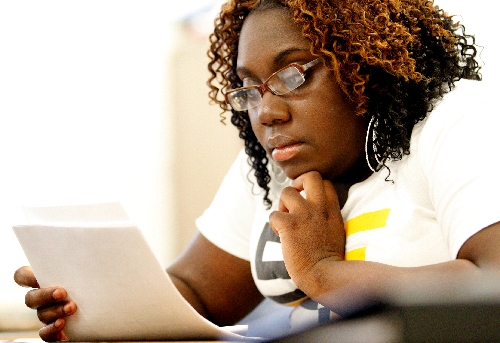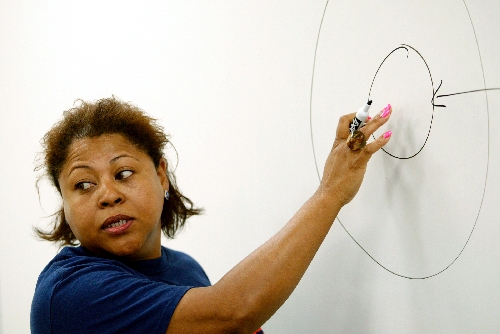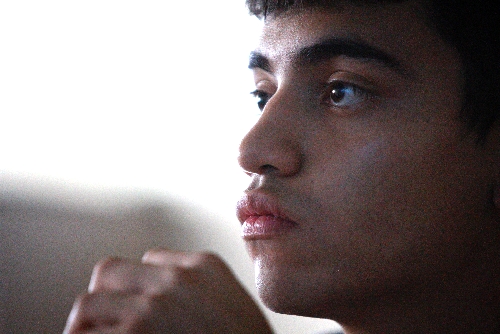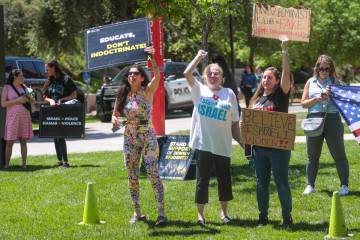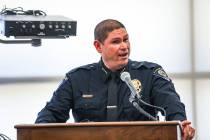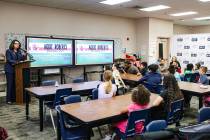Seniors prep for failed proficiency exams to earn high school diplomas
Krystol Holmes lumbered in late for her last chance to graduate before summer's end.
"Waking up was hard," the sleepy-eyed teenager said as she made her way down Clark High School's empty halls at 8:15 a.m. on the first Tuesday after the last day of school.
She headed for one of the few classrooms with lights on.
Unlike Holmes, most of her friends will never have to walk these halls again.
The 18-year-old senior passed all her classes with B's and C's and was rarely absent. But she's back in school because one test still holds her diploma captive.
Three other seniors in Holmes' classroom and 1,256 others are sitting in schools across the Clark County School District this summer. They've all failed to pass one or more parts of the Nevada High School Proficiency Exam, which covers writing, reading, math and science. Some have failed the test as many as five times since their sophomore year. They're back in school to prepare for one last-ditch effort this summer.
Holmes is on her fourth try at the science test. She failed by one question last time, and is exactly the kind of student the district's new leaders are targeting in a monumental effort. The district is spending $1 million in federal grants to tutor Holmes and her peers this summer. The goal: push these just-shy seniors over the top and drive the district's graduation rate higher.
An additional 500 other seniors also are sitting in Clark County high schools this summer, making up needed courses by taking them online.
Holmes will be tutored from 8 a.m. to noon every weekday for four weeks by Valley High School teacher Leyla Morrison, who's empathetic but realistic.
"There is not enough time," said Morrison, who volunteered for the job. She doesn't have the time to pester the absent to attend, or the lazy to do their homework. "It's up to the kids how bad they want it."
She doesn't say a word to Kristol about being late.
"I want you to know I've been there before," Morrison told her new students. "You will pass."
The 16-year science teacher from Central America hoped to inspire quick confidence with her story of taking the Texas high school test three times to earn her diploma.
The summer cram session is a first for everyone, an experiment with an uncertain result. But just a few success stories will be worth it to Morrison.
"That's why I'm here. I just can't let them go by without helping," Morrison said after sending Holmes off to take a practice test. The other students had already done so and had moved on to cutting out lists of key concepts, gluing the strips of paper to flash cards. She urged them to study after their four hours with her.
Will it be worth the work? Morrison thinks so. So does Holmes, who realizes that "without a diploma, you can't get a job." She wants to be a pediatric nurse, has a plan laid out for studying at the College of Southern Nevada for two years and then transferring to the University of Nevada, Las Vegas. Her two older brothers skipped college and joined the workforce, landing in construction and heating and cooling.
"I can keep trying," Holmes said. "There are people behind me."
They include her mother and numerous teachers. She's not bitter about having to retake the test. She understands its purpose is to ensure that all seniors graduate ready for the workplace or college.
PLAYING CATCH-UP
Those who fail to pass whatever portion of the proficiency exam they need this summer will be invited back to school in August, said district Deputy Superintendent Pedro Martinez, who oversees instruction. The science exam was given Monday. The exams in reading, writing and math also will be given this week. Those who fail won't have another chance until November.
Martinez hired only teachers with 80 to 100 percent success rates to tutor in this summer program.
"Take your best teachers and get those kids to graduate," was his message to the district's 49 high school principals.
This group of near-graduates is nothing new in a district that, in the past, saw about one out of every two students earn diplomas.
The graduation rate was 59 percent at the close of the 2010-11 school year. This last school year started on the same low note in August, with 52 percent of 20,596 seniors on track to graduate. But Superintendent Dwight Jones, in his first full school year in Clark County, wanted more. Efforts were mounted throughout the school year to help seniors catch up: one-on-one interventions, tutoring before and after school, individual mentors, classes specifically for preparing for the proficiency exam. That boosted the graduation rate to 65 percent by June 7.
Some 4,000 seniors were still missing one or two things though, Martinez said. So, the district offered a summer service costing just $20. Summer credit-recovery courses usually cost $200 per credit, but the district wanted all the students to have the opportunity and allowed principals to waive the $20 fee in some cases.
About half of the eligible seniors signed on. Those who succeed will be recognized in the district's first August graduation ceremony.
"That 65 percent (graduation rate) is going to come up," Martinez said. "It's only a question of how much."
CRUNCH TIME
Raising the graduation rate relies on Holmes and those like her. Cris Solis, would have graduated in 2011 but didn't because of the science test. He has been a housepainter for the past year and is now in the same class with Holmes.
"It sucks," he muttered into his chest.
He wants to be a dental assistant but realizes he has to go back to school to move forward.
"Being here is a struggle for me," he said.
But time is of the essence - Morrison and her students have just four weeks to achieve proficiency.
"I know cutting is relaxing, but you have to hurry up," she told Cris as he made flash cards in the room that lacked air conditioning. They also made do without running water because of a summer remodeling project at Clark.
Physical science, the students' shared weakness, was the first topic Morrison tackled. She starts with particles.
"The particles of this desk are moving," she explained in an introduction to gases, liquids and solids. "We don't see it, but they're always moving."
She teaches quickly, telling her four students what to focus on at home.
"I'm trying to not overwhelm them, but they're behind," she said at the end of week one. "We can't force the horse to drink the water. I don't know. I just keep teaching."
In week three, Monroe and her pupils continue the drill. Some have studied at home more than others. One 17-year-old boy, Edgar Diaz, is behind in his English-speaking skills but comes every day and "studies so hard," Morrison said.
School's difficult for other reasons though. Edgar's pushing against his peers. His friends are in the same boat as he is and need to pass the state proficiency exam to graduate. But they're making do with certificates of attendance, which are given to students who passed their classes but not the proficiency exam.
"They say they're going to come, but they're not coming," Diaz said.
Edgar passed the reading test after three tries; the math test after four tries; and the writing test after two tries. But he still needs to pass the science test to attend the College of Southern Nevada and study auto mechanics.
"I want to pass," he said before returning to a flash card, reading it under his breath.
Contact reporter Trevon Milliard at tmilliard
@reviewjournal.com or 702-383-0279.



